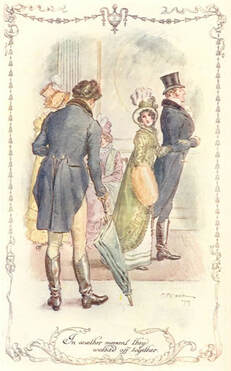Perhaps, but we can certainly catch her in the act of cleverness -- for example, in the way she uses weather to shape events.
"Austen makes her plots turn on the weather," writes John Mullan in his insightful and delightful What Matters in Jane Austen? "Having arranged her characters and defined their situations, having planned her love stories and hatched the misunderstandings that might impede them, she lets the weather shape events. It is her way of admitting chance into her narratives."

But Jane Austen subtly, cleverly, uses the weather to bring events about. Professor Mullan illustrates this with the example of the rainy day in Bath when Anne Elliot, her sister Elizabeth and the artful widow Mrs. Clay go shopping on Milson Street with Mr. Elliot. It begins to rain and Austen arranges matters so that after some bustle about carriage rides and errands, Anne and Captain Wentworth encounter one another in a shop. He watches as Anne walks off with Mr. Elliot in the "manner of the privileged relation and friend." The captain's walking companions remark on how Mr. Elliot is obviously taken with his cousin Anne.
(And I think -- after all the punishment Anne has endured, watching Captain Wentworth thoughtlessly flirt with the Musgrove girls -- I think she has the right to take a little pleasure in his discomfort.)
Another example of using weather to shape events is the light snowfall in Hartfield on the night of the Westons' dinner party which results in Mr. Elton being alone in a carriage with Emma.
A further example, which was so subtle I hadn't noticed it, occurs also in Persuasion...
Austen uses the rain to "arrange her characters" and bring about the emotional climax of the novel:
| [Anne] could not keep her appointment punctually, however; the weather was unfavourable, and she had grieved over the rain on her friends' account, and felt it very much on her own, before she was able to attempt the walk. When she reached the White Hart, and made her way to the proper apartment, she found herself neither arriving quite in time, nor the first to arrive. The party before her were, Mrs Musgrove, talking to Mrs Croft, and Captain Harville to Captain Wentworth; and she immediately heard that Mary and Henrietta, too impatient to wait, had gone out the moment it had cleared, but would be back again soon, and that the strictest injunctions had been left with Mrs Musgrove to keep her there till they returned. She had only to submit, sit down, be outwardly composed..." |
Instead, Anne is free to hear Mrs. Croft decidedly pronounce: "To begin without knowing that at such a time there will be the means of marrying, I hold to be very unsafe and unwise, and what I think all parents should prevent as far as they can."
| "Anne found an unexpected interest here. She felt its application to herself, felt it in a nervous thrill all over her; and at the same moment that her eyes instinctively glanced towards the distant table, Captain Wentworth's pen ceased to move, his head was raised, pausing, listening, and he turned round the next instant to give a look, one quick, conscious look at her." |
But none of that could have happened in that way, without a little rain shower!
Previous post: A Shelley find in Naples Next post: The abomination that is the Mary Wollstonecraft statue
| The rainy day on Milsom Street also features in my short story about Mrs. Clay in the Rational Creatures anthology, but it is told from Mrs. Clay's point of view. Click here to see more about Rational Creatures. |


 RSS Feed
RSS Feed